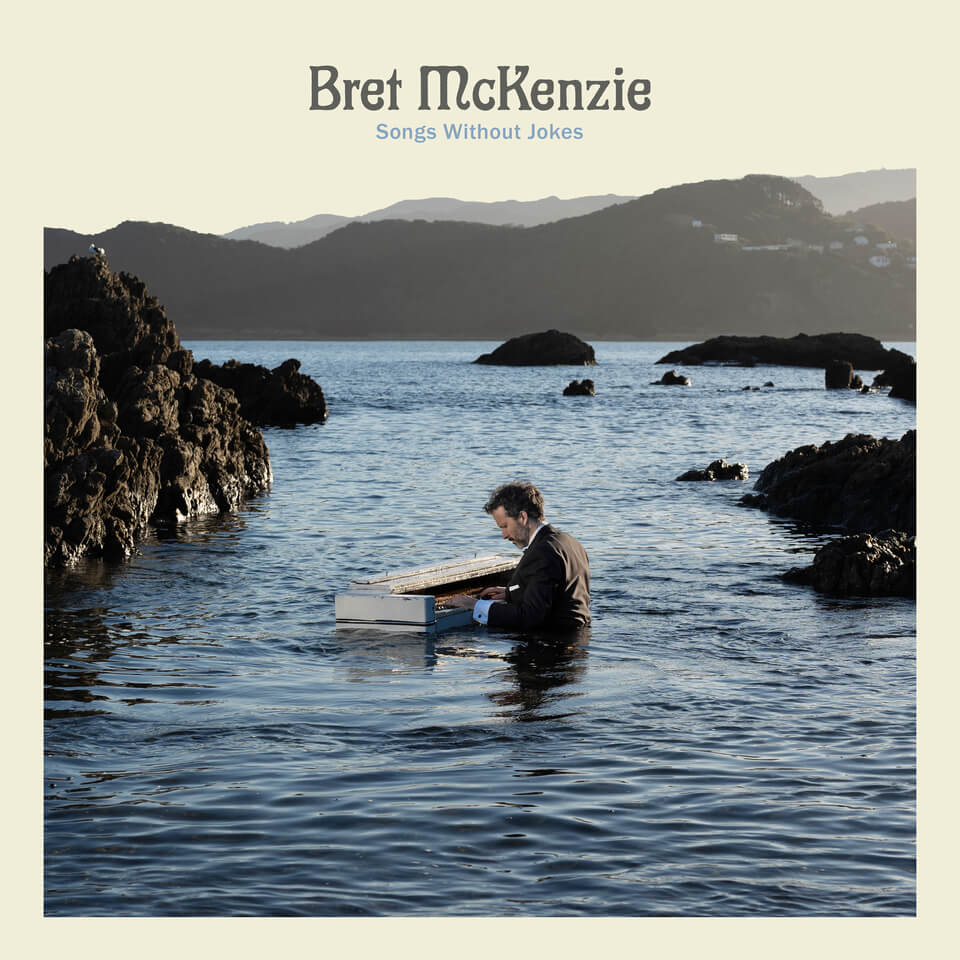I wasn’t sure what to expect of this, Bret McKenzie’s first solo record. Anybody familiar with his career knows that he has a way with a tune. The perfectly observed musical parodies that formed much of the material in Flight of the Conchords managed the admirable double trick of being amusing send offs of their source material and genuinely catchy songs in their own right. ‘Inner City Pressure’, their nod to Pet Shop Boys, is a particularly good example of this. McKenzie also wrote the Oscar-winning ‘Man Or Muppet’ – one of the better songs to take home the Best Original Song Academy Award in recent years.
But I had no idea what his musical identity is. What would his songs sound like separated from the need to contain specific musical cues? Given total freedom, how would he choose to express himself? Unfortunately, this is something that he doesn’t manage consistently on Songs Without Jokes. The title itself seems to allude to the difficult crossroads he finds himself at: leave behind the humour, and what instead does he bring to the songs?
The truth is, this isn’t a complete abandonment of his previous musical identity. Whilst there is a seriousness and a sincerity of sorts and the songs are indeed ‘Without Jokes’, the aping of other styles and artists is still very much part of his MO. It is this that proves the record’s undoing. Reaching predominantly back into the 70s and 80s, many of the resulting songs are sonically perfect homages to various artists of the period. However, the lyrics are not humorous pastiches of those artists, nor are they profound or lyrical enough to stand up in their own right. The result is a record that too often feels like the work of a highly musical person with too little of their own musical identity.
Opener ‘This World’ is a case in point. Stylistically it could easily be a Randy Newman song, with its stomping piano and guitars on the verses and parping brass on the middle eight. But whilst the lyrics recall Newman’s wry view of the world, they lack the wit and concision that Newman brings to his own songs. Banal observations about how “the air is filthy” and “this world is broken” feel half-baked and underwhelming.
‘If You Wanna Go’, meanwhile, sounds like something Billy Joel or Elton John would have written in a hurry at their peak, a generic end-of-relationship song with the singer declaring he’s “done waiting ’round for you”. ‘Dave’s Place’ is better, an uptempo number whose cynical “Well hooray for you” on the chorus lends the song some of the bite and humour lacking elsewhere. Despite this, it still sounds too much like a riff on ‘Dancing In the Dark’-era Bruce Springsteen to ever fully feel like a song in its own right.
The album is most successful when McKenzie, whilst still working with a retro aesthetic, at least seems to be letting himself into the songs a bit more. Although there is a surface-level sincerity throughout, the slightness of the lyrics too often renders this sincerity unconvincing. It is on those songs where his identity shines through most strongly that the sincerity works. ‘Carry On’ portrays a down at heel protagonist alone, possibly after a break up or a death, down but not defeated. The wordless melody he sings after the chorus is beautiful and perfectly conveys the protagonist’s recognition that their lot is rubbish, but they will carry on anyway.
‘Up In Smoke’ is also highly affecting – an ominous portrait of forest fires that spins the central image into a moment of existential pondering. The central imagery is haunting and carried effectively by the song’s minor key piano.
I just wish that the album had contained more moments like this. When he gets it right, McKenzie is clearly a songwriter of talent who can captivate the listener without the safety net of humour. Too often, though, it feels as though he is unconfident in his art and reaching for the safety of imitating others rather than showing what he is capable of. I found the record on the whole unsatisfying, but I am really interested to see what he does next. Hopefully he will have the confidence to allow more of himself into his songs.
Words by Will Collins

Leave a comment